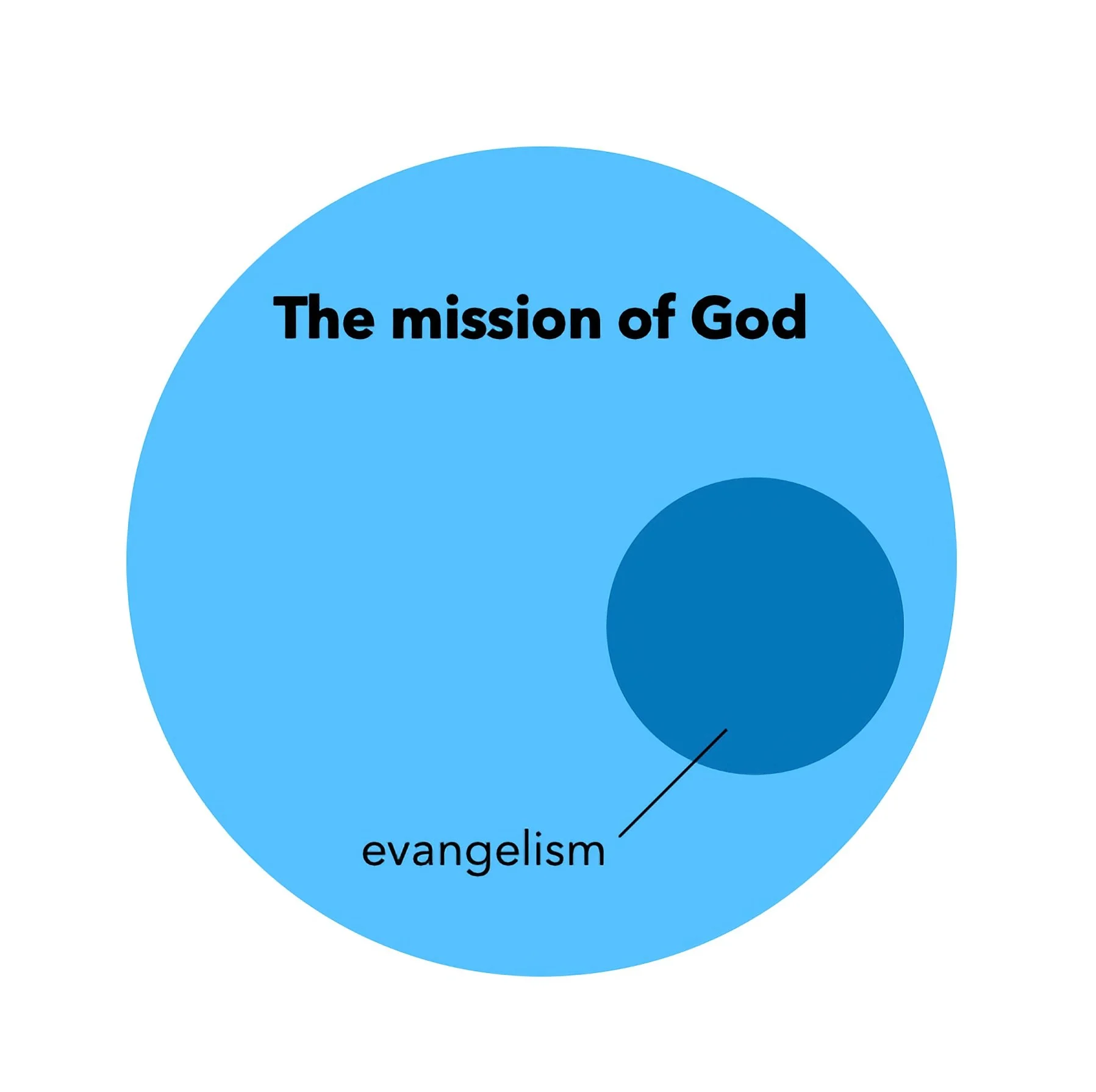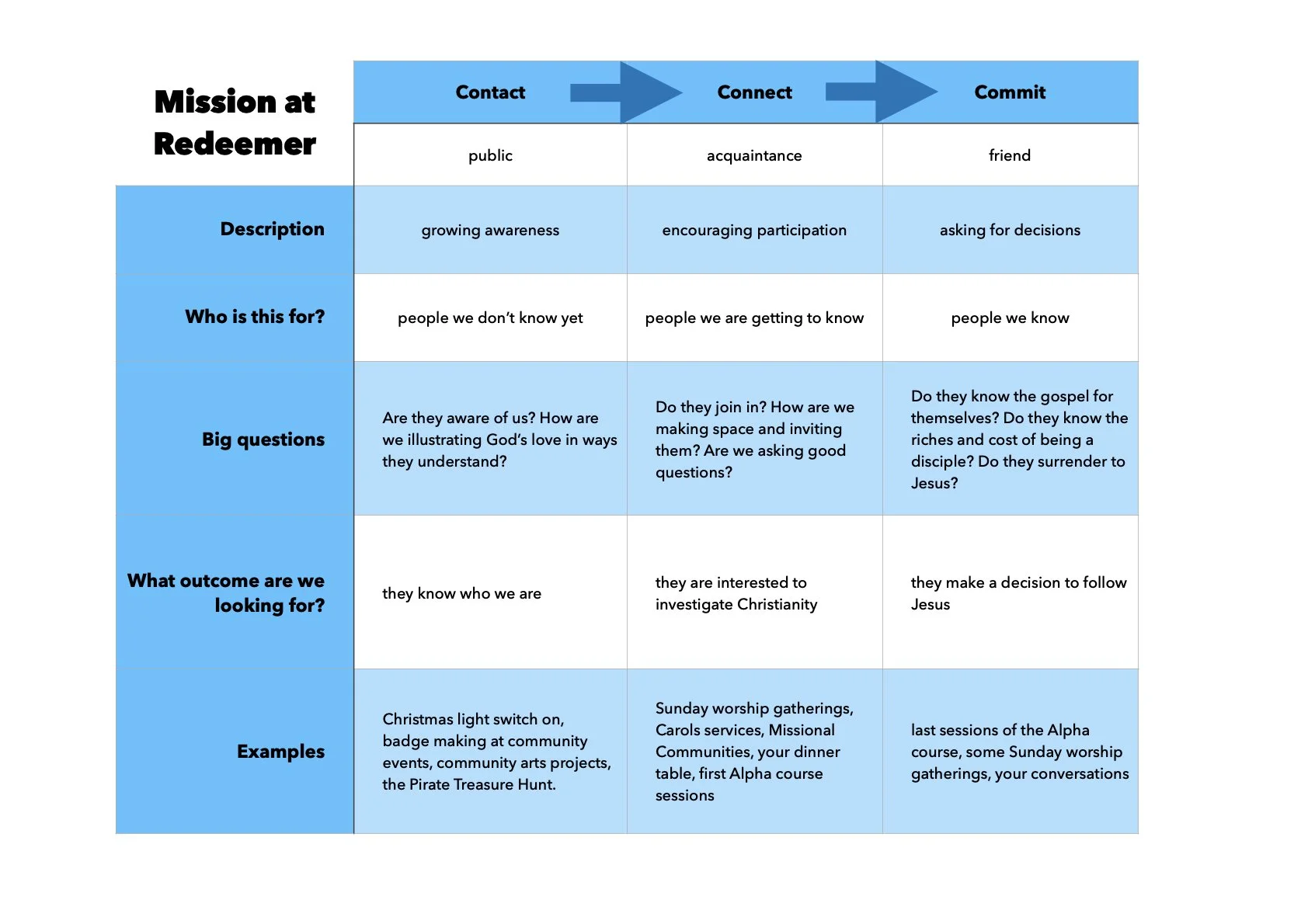What is the mission of God all about?
The main thing we do at Redeemer, being a church in Manchester, is join God’s mission to bring wholeness to Manchester. God’s mission is to bring His kingdom to bear on ours, such that the heavens and earth will be one (as in the Lord’s Prayer in Matthew 6.8-13). When we are rescued by Jesus and become Christians we are saved from our own small self-focussed mission to a much bigger and better story: God’s global mission. This is one of the beautiful things that Jesus offers.
We define joining God’s mission as having others hear Jesus’ words and experience His family, so that they will surrender to both.
Mission, therefore, is a big part of the Christian life. Mission can also be one of those words that we talk about but don’t follow through in our lives. Sometimes that’s because “mission” is such a big and loaded term, it doesn’t get the clarity it needs in order for us to be obedient in following through.
This is a very short overview of how we join God’s mission at Redeemer. This isn’t the only way, but it’s how we’ve decided to make disciples. It’s also something we are always striving to get better at.
Mission and Evangelism
The place of evangelism in joining God’s mission
A common mistake people make is to equate mission with evangelism. Evangelism is the sharing of the good news of the gospel. News requires words. Evangelism is part of mission, but not the whole thing. As an example, doing good things for your neighbours isn’t evangelism, but it is still important, required, and part of mission. Mission includes many aspects, of which evangelism is an important part. The goal of this document is to give an overview of how Redeemer joins God on His mission, not the particulars of evangelism itself.
Let’s also be clear as to what isn’t evangelism as well. Being part of a community outreach event isn’t evangelism unless you speak to someone about the gospel. Taking care of an elderly neighbour isn’t evangelism, being a good employee isn’t evangelism, and inviting someone to an evangelistic event isn’t evangelism. These are all good things, all necessary things, all part of God’s mission, but they aren’t evangelism in themselves.
Actions and Words
When presented with following God on His mission, we generally flee from it. This is understandable, it’s a scary thing! When we run away from our calling as Christians, we normally jump to one of two sides.
The secular parts of our hearts don’t want to do anything with Jesus mostly out of fear of what others will think. We’re happy to do good things for others and be seen as good people, but not use our words to talk about the gospel.
The other side is more like fundamentalism, which believes we should just tell people what they need to know and that’s it. We end up using a lot of words but not living the life to back them up or illustrate what those words look like in practice.
Interestingly, both the secular and fundamentalist parts really end up in the same spot: often not doing anything. And if they actually do something it’s not effective. The reason it’s not effective is because we’re called to something beyond the secular and fundamentalist. We’re called to live how the Bible calls us to live: words and deeds. Jesus’ words and the experience of His family.
What we do and what we say are both part of mission, and they are linked together. The gospel requires words to communicate and actions to illustrate. One can’t say “I love you” and not act it out. Also, one must actually say “I love you,” not merely act it out.
Though words and actions are connected, there will be times where we use only actions, and others where we use only words. One needs only to look at how Jesus modelled mission for us to see that words don’t have to accompany actions every single time, and vice versa.
God’s Mission In the Bible
It’s common for people to just do what previous churches have done and label it biblical. Or we come up with new ideas for the sake of being new. What does it look like to live this out as a faithful and loving church in Manchester? Before we decide tactics (our specific actions), we must look at the bigger values and objectives the Bible lays out.
Let’s take a very quick look into some texts in the Bible that tells us how to live on God’s mission. We’ll start with God’s covenant with Abraham.
Genesis 12.1-3:
The LORD had said to Abram, “Go from your country, your people and your father’s household to the land I will show you. I will make you into a great nation, and I will bless you; I will make your name great, and you will be a blessing. I will bless those who bless you, and whoever curses you I will curse; and all peoples on earth will be blessed through you.”
God’s mission here is to bless all nations. The way this blessing will come about will be through Abraham. Ultimately this is fulfilled in Jesus, who blesses all those who are in Him. And how will others be blessed? Through those who receive God’s blessing. We are blessed to bless others. The Bible is filled with ways to live in order to bless others. Sometimes this is in how we live, sometimes in what we say.
In Jeremiah 29, God’s people have been taken away from their home as refugees of war and are now living in a place that doesn’t revere God. As God’s people in this spiritually hostile environment we read:
Jeremiah 29.7:
Also, seek the peace and prosperity of the city to which I have carried you into exile. Pray to the LORD for it, because if it prospers, you too will prosper.
We seek the peace and prosperity of the place God has called us to, even as we live as spiritual exiles. Our own welfare is tied up in it! Joseph was a good example of this, Daniel was a good example of this. This command to seek the welfare of our city is not just about evangelism in particular, it’s about mission in general. We are called to be good neighbours, good employees, as well as good mouthpieces for God. A healthy church is one that seeks to live this wholehearted life out.
Paul instructs the church at Corinth how to live out God’s mission in their own context, as people who are called by God in His mercy:
2 Corinthians 4.1-6:
Therefore, since through God’s mercy we have this ministry, we do not lose heart. Rather, we have renounced secret and shameful ways; we do not use deception, nor do we distort the word of God. On the contrary, by setting forth the truth plainly we commend ourselves to everyone’s conscience in the sight of God. And even if our gospel is veiled, it is veiled to those who are perishing. The god of this age has blinded the minds of unbelievers, so that they cannot see the light of the gospel that displays the glory of Christ, who is the image of God. For what we preach is not ourselves, but Jesus Christ as Lord, and ourselves as your servants for Jesus’ sake. For God, who said, “Let light shine out of darkness,” made his light shine in our hearts to give us the light of the knowledge of God’s glory displayed in the face of Christ.
We “commend ourselves to everyone’s conscience”. This means we live godly lives, and when we speak we do so “not of ourselves, but Jesus Christ as Lord”. Words and deeds in concert.
The way we live not only legitimises the words of the gospel, it also paves the way for us to talk about this message. In the context of doing good, we read: "Always be prepared to give an answer to everyone who asks you to give the reason for the hope that you have" (1 Peter 3.15). We are called to live in such a way where people wonder and ask us why. We need to have the words of hope at the ready, and if we are living in the risky, faith-filled way God has called us to, people will ask.
Earlier in 1 Peter we read: “Live such good lives among the pagans that, though they accuse you of doing wrong, they may see your good deeds and glorify God on the day he visits us” (1 Peter 2.12). How will people know to glorify God when they see our good deeds? Someone must tell them.
With this in mind it’s clear to see how Jesus operated as well: signs and teaching. Jesus came to speak about and illustrate the kingdom of God. He would heal (sometimes He called for faith, sometimes as a reaction to faith, sometimes seemingly not related to faith at all), illustrating what the kingdom of God looks like, and then would teach about His kingdom. To follow Jesus means to join our actions and words.
Let’s consider the example of Jesus calling Matthew in Matthew 9.9-13:
As Jesus went on from there, he saw a man named Matthew sitting at the tax collector’s booth. “Follow me,” he told him, and Matthew got up and followed him.
While Jesus was having dinner at Matthew’s house, many tax collectors and sinners came and ate with him and his disciples. When the Pharisees saw this, they asked his disciples, “Why does your teacher eat with tax collectors and sinners?”
On hearing this, Jesus said, “It is not the healthy who need a doctor, but the sick. But go and learn what this means: ‘I desire mercy, not sacrifice.’ For I have not come to call the righteous, but sinners.”
First, Jesus sees Matthew and goes to him. For Jesus to go to Matthew would be transgressing social boundaries: a good Jew talking to someone who has betrayed his own and sided with the Romans? Jesus goes first. As He was on His way from one place to another, He saw someone who didn't know Him yet. Jesus didn't just look and move on, He went over to him. And then He invited Matthew into a relationship that would change His life.
Secondly, Jesus tells Matthew to follow Him. There are words that Jesus uses, combined with his action of going to him. What does it look like for Matthew to follow Jesus? The first thing we read is Matthew’s friends (an unsavoury bunch) eating dinner with him and Jesus. For Jesus to be in this man’s house, eating and drinking with them would be a much more transgressive act. And we see how so-called righteous people respond. They don’t think Jesus should be spending His time with sinners. But that’s exactly the people Jesus came to save.
Thirdly, Jesus explains His mission. Jesus has actions and He uses His words to interpret those actions. Without His words, we would be left to sort it out ourselves and probably get it wrong. Healthy mission is actions and words. Both are required.
A church that cares for, seeks, and invites people they don't know yet into a relationship with Jesus: that's the heart of Jesus Himself. That's the kind of church we will always be: one that seeks others.
Notice that Jesus didn’t just shout at random people. He wasn’t on street corners talking loudly to people who didn’t want to hear. He would find ways to gather people around Him (sometimes through calling them or healing them directly, sometimes because others heard of His teaching and healing), and then speak in ways that they would understand. When they got hungry, He would feed them. And even in that simple act He would demonstrate what it means to be part of the kingdom of God. Jesus knew people, had some kind of initial connection with them, then invited them to a deeper relationship.
Whether Jesus or Paul put into practice some kind of specific method of evangelism or not doesn’t give us enough information to tell us exactly what to do. It does give us enough to exercise our own wisdom as we strive to have people hear His words and experience His family in ways they can understand.
How will we put this into practice?
What does it mean to follow Jesus, the friend of sinners, in Manchester where 99% don’t know or care about Him? We get in contact with people in order to connect with them so that they will commit to Jesus. The threefold process of contact, connect, and commit is how we live out what it means to be a friend of sinners.
To be a disciple of Jesus means to faithfully live on His mission to make disciples of all kinds of people. We take our cue from how Jesus lived, and we first must consider where they are with God to begin with. The Engels scale was developed as a way to help Christians understand where people who aren’t Christians yet are starting. Everyone has a process of coming to faith and this tool helps us visualise the points along the way to someone becoming a disciple.
The Engels Scale applied to being a church in Manchester
We’ve adapted this scale to create three main sections: Contact: 0-3, Connect: 4-7, Commit: 8-10. This runs from no knowledge or framework for God at all (0) to deciding to become a Christian (10). Most evangelistic materials or events generally run in the “Commit” stages, from 8 to 10, but most people, especially in our context, are in the previous stages. If we want people who are at a 1 or a 4 to come to know Jesus, we have to meet them where they are first.
Contact is initiating a relationship with others and having others get into contact with God. Connect is cultivating those relationships, and when we get to Commit we can do that well because we’re in a good relationship with them and they understand what it is we are asking them to commit to.
In your own personal life you are (hopefully) involved in all of these areas all the time. The job of the church isn’t to do your ministry for you, but to equip you for your own work. Part of the job of the church is to equip you to engage in these different levels on an individual level and on a larger, corporate level.
Larger all church community outreach events like the Christmas light switch are ways we help you get into contact with people we don’t know yet, people who don’t have any contact with Christians. The shared mission in our Missional Communities is there for people who we are getting to know, but don’t know Jesus yet. Some aspects of our Sunday morning and the last sessions of the Alpha course are examples of evangelism as people are closer to understanding what we’re asking them to commit to. Of course your own dinner table runs the whole scale!
Where is evangelism in this method? In any of these events, it’s in the conversations you have with people: those you’re serving, those you’re getting to know, those you already know. If you don’t speak words of life (not the event leader, but you, yourself!), it’s not evangelism. Let’s all hear where people are so we can all communicate the gospel in compelling and effective ways, so that more will come to Christ.
This is also why we have a shared mission in our Missional Communities. Unlike the individual reactive mission in our lives (with our neighbours, family, friends, etc.), Missional Communities have a shared proactive mission, where we work out what it means to be on mission towards a particular people group together.
The Context of God’s Mission
What joining God’s mission looks like for us as a church in Manchester
One of Redeemer’s values is to be relationally committed. That means we are always trying to do what we do in the context of relationships. This informs how we speak, events we put on, as well as helps us choose what we’re less likely to do.
Because the life of a Christian is not lived in a vacuum but in relationship with each other, we will always be contextualising our actions and words. To be faithful to the Bible we must consider how our words will be received, not to change the message of the gospel but to make sure we are communicating it well. To not consider how our words are received shows a lack of compassion and creativity, and makes the gospel easier to be rejected. The only way we can rightly contextualise our message is if we know the people we’re talking to, even at least in part.
A simple biblical example of this is how Paul talks in Acts 17.1-4 versus how he speaks in Acts 17.16-33. The first is a synagogue in Thessalonica, and he reasons from the Scriptures on some specific points related to Jesus’ death, resurrection, how He is the Messiah, etc. The second situation we see Paul in Athens, the birthplace of Socrates, a non-Jewish environment. Instead of reasoning from Scripture to begin with, he uses what he sees and the philosophers they read. Whereas Jesus being the Messiah was a focus in the synagogue, that aspect isn’t in focus in the marketplace and Areopagus.
When Paul is preaching in the marketplace, it’s a place where people were already going in order to hear these kinds of topics being talked about. Paul went where people were and where it made sense for the gospel message to be preached. Be it the religious or economic centre, in private or in public, Paul crafted his message with the people who would hear it in mind.
In the same chapter we see the same message being communicated in different ways. Paul chooses to focus on different aspects of the gospel when speaking in different contexts. He doesn’t change the message of the gospel, but takes into consideration how to communicate that message to different types of people, in order that as many as possible will believe.




